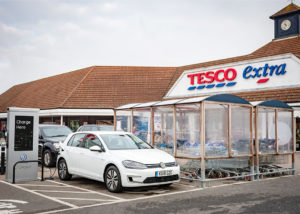 Pubco Marston’s and supermarket giant Tesco have announced big plans for electric vehicle charging infrastructure.
Pubco Marston’s and supermarket giant Tesco have announced big plans for electric vehicle charging infrastructure.
Tesco will install 2,400 EV charging bays across 600 stores over the next three years in a deal with charging firm Pod Point. Some will be free-to-use 7kW units, others 50kW rapid chargers, which shoppers will pay to use.
Pod Point describes the deal as a “new model” with Volkswagen involved as a sponsor. See details here.
Public charging houses
Meanwhile Marston’s is installing 400 rapid charges at pubs across the country under a deal with charging firm Engenie. The chain thinks the move will increase footfall at its pubs – and potentially extend opening hours.
Marston’s energy manager, Andy Kershaw, wouldn’t be drawn on how he managed to get the deal signed off by the board, nor financial terms of the 15-year leasing and revenue share arrangement. But he said the company hopes to capitalise on an EV “ownership boom” in the next few years.

The 50kW rapid chargers, owned and operated by Engenie, mean people can charge their cars in 30-60 minutes. “That fits well with the dwell times of a meal in a pub,” said Kershaw. “It’s almost a perfect match.”
The pubco also has lodges at some sites and may install slower chargers for overnight guests in a bid to keep rapid chargers free for passing trade.
Engenie business development director, Patrick Sherriff, however, said that when slow and fast chargers are sited next to each other, “people always go for the fast charger.” Marston’s would therefore need to work on marketing and incentives to make that approach work.
But Kershaw said Marston’s sees “a lot to gain from being an early adopter”.
Full service
Customers will be charged 30p/kWh plus VAT and Marston’s will take a cut. But Kershaw said the business isn’t banking on “hundreds of thousands of pounds” coming in from charging revenue any time soon.
“For us, it is not about profit, it is about service. In some locations it will give us the ability to extend the trading day slightly. A traditional pub might not open until late morning. But it may now become a breakfast site, or a place to meet for coffee and cake while you charge your car,” said Kershaw. “The days of being a traditional boozer are long gone.”
The deal with Engenie intends to deliver 400 chargers across 200 sites, but Kershaw said Marston’s, with around 1,500 pubs, may ultimately build its own network.
Pubs the new petrol stations?

Engenie’s Sherriff thinks pubs and other destination locations could ultimately become the new filling stations.
“There are around 8,500 [petrol stations] in the UK. They will only be able to do a tiny percentage of EV charging because of grid constraints,” said Sherriff. “Marston’s will be able to attract people from that market.”
Grid constraints
However, grid constraints are not limited to petrol stations. “Grid [capacity] is an issue,” said Kershaw. Adding 50kW-plus of chargers “is like building a pub next to a pub [in terms of consumption] and that capacity is just not available in a number of parts of the country.”
Given the cost of capacity, “developers want to keep headroom to a minimum,” said Kershaw. That leaves very little for the pubco to work with when it acquires the building and wants to install chargers.
“The cost of getting grid capacity to site is probably the most significant part of the [EV charging infrastructure] equation,” he said.
Sherriff suggested smart charging and batteries, should prices fall, may in future help address constraint issues. But despite current challenges, both he and Kershaw think faster chargers at destination sites likely have more mileage than other models.

“Many of Marston’s sites are in built up areas,” said Sheriff. “Half of people who own a car do not have off street parking. Where are they going to charge? Not from a 1kW lamppost.”
Kershaw agrees. “As we are seeing in Scandinavia, people will change their habits and plan their journeys.” Instead of driving to the petrol station, “they will go to a pub, a restaurant, a shopping centre to charge their cars”.
Related stories:
Chargepoint raises £189m to fund EV charging infrastructure
Total partners with Chargepoint to bundle energy and EVs to businesses
Bring forward zero carbon transport target, MPs urge
Octopus backs flex and EVs for growth
Energy managers to become fleet managers
BT procurement chief: Convergence is coming, energy managers must articulate impacts
Eon boss: Decarbonising power is done, now for heat and transport
EV boom no sweat, says National Grid
Flexitricity chief: UK has enough spare power electrify every car on the road
Nissan: Vehicle to grid services will not drain EV batteries
Pivot makes huge play for 2GW storage and EV charging network
‘Land grab’ for EV car parks and revenue
National Grid predicts huge solar growth, while EVs create huge storage capacity
Follow us at @EnergystMedia. For regular bulletins, sign up for the free newsletter.




Until the 1960s, many out of town pubs also had a row of petrol pumps in their car parks (or sometimes on the kerbside next to the entrance), so in some ways it’s not a new idea. But there’s always a danger that someone looking to charge their car and wait 30 minutes will just “pop in for a quick one”, with a consequent risk of an increase in drink-driving.
30p/kWh is also not cheap; most EVs currently on the market achieve only around 3 miles per kWh (various websites suggest real-life consumption varying from around 2.2 mile to 4.5 miles), so this would give a cost of around 10p a mile (range 6.7p to 13.6p). This is not much better than can be achieved with a modern car – over the past 12 months my diesel Smart (and the electric Smart ED is thought to be pretty average in its consumption) has averaged over 69 mpg, which equates to 8.5p per mile at today’s Tesco price (£1.289 per litre). Of course other EV running costs (principally servicing) may be lower, although capital or depreciation costs certainly aren’t, even after any Government incentive.
As the article says, many EV owners may have few alternatives for charging (unless they live in Milton Keynes, of course, which shows that public charges can be installed at scale in the UK) so may have to put up with this. But if they are planning a sustainable business, My advice to Marstons would be to lower the unit charge on the slow charger (perhaps to 20p/unit, which is still significantly more than the usual retail price of electricity) to act as an incentive to use them rather than the fast chargers, for which people may be willing to pay a significant premium.